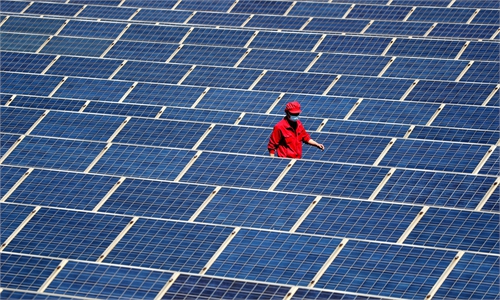China’s financial system is 'strong enough' to stave off negative impact from US, EU bank crisis
China’s financial system is strong enough to stave off negative impact: experts

Pedestrians are reflected on a window with the logo of Swiss bank Credit Suisse in Zurich, Switzerland, on March 16, 2023. Photo: VCG
US and EU regulators' massive liquidity assistance to embattled banks has sent relief to global markets, but the prospect of a deepening banking crisis in the developed economies remains not effectively defused.
They said the turmoil in the US and European banking sectors will not spread to China, while adding that China should prepare for tumbling overseas demand if there emerges a financial crisis in the US.
Switzerland's largest bank, UBS, said on Monday that it will acquire Credit Suisse for 3 billion Swiss francs ($3.2 billion), after the 167-year-old embattled lender was brought to the brink of collapse last week.
The deal, which is not subject to shareholder approval, is expected to create a bank with more than $5 trillion in total invested assets and sustainable value opportunities, UBS said.
"The UBS buyout of troubled Credit Suisse will bring some relief to jittery markets. However, financial instability that is sweeping across the US and the EU has not passed and more risks may emerge if they continue to hike interest rates," Wan Zhe, an economist and professor at the Belt and Road School of Beijing Normal University, told the Global Times on Monday.
US and EU regulators are likely to be caught up in a mess of policies aimed at taming elevated inflation while stemming bank system risks, she said.
In order to boost the flow of US dollars through the global financial system, the US Federal Reserve (Fed) announced on Sunday that it had joined with the Bank of Canada, Bank of England, Bank of Japan, European Central Bank (ECB) and Swiss National Bank in a coordinated move to enhance the provision of liquidity through daily US dollar swap line arrangements.
As liquidity pressure in the US and EU banking system shows some signs of subsiding, the Fed may continue to increase interest rates this week in order to control domestic inflation, Tian Yun, an independent analyst, told the Global Times on Monday.
He said the stress on US lenders, asset management bodies and other financial institutions will only increase, and as a result generate bigger risks.
The ECB just raised interest rates by 50 basis points on Thursday.
In February, CPI increases in the US and the EU remained high despite aggressive rate hikes. The annual inflation rate for the US was 6 percent last month, whereas that in the eurozone was 8.5 percent, official data showed.
The Hong Kong Monetary Authority said in a statement on Monday that the exposures of the local banking sector to Credit Suisse are insignificant, and the Hong Kong financial system is resilient with strong capital adequacy.
Credit Suisse's operations in Hong Kong comprise a branch and two licensed corporations, which opened for business on Monday as usual and customers can continue to access their deposits with the branch and trading services provided by Credit Suisse for Hong Kong's stock and derivatives markets, according to the statement.
"We do not have to worry too much about the negative spillover effect of the banking crises in Europe and the US," Liu Xiaolei, a professor from Guanghua School of Management of Peking University, told the Global Times on Monday.
However, China has its own challenges, such as swelling local government debt. Therefore, the country should continue to boost institutional reform and strengthen financial supervision to head off risks, Liu said, adding that economic development is the key to addressing the problem.
Unlike volatile US financial policies featuring ultra-loose monetary policy and aggressive tightening, China has maintained a prudent monetary policy even amid heavy economic downward pressure.
"China should make preparations for an extreme scenario under which the US banking crisis evolves into a bigger crisis. In that case, the US economy will 'freeze' and its imports will plunge too," Tian said.
The People's Bank of China (PBC), the country's central bank, said on Friday it will cut the reserve requirement ratio (RRR) for financial institutions by 0.25 percentage points from March 27, the first time in 2023.
Wan said the central bank's move will inject liquidity into the domestic market to propel the economic recovery, and lessen pressure on commercial banks.
At its recent annual meeting on financial stability, the PBC vowed constant efforts to prevent and contain financial risks, and hold the bottom line of no systemic financial risks.
The PBC said that it will actively and steadily reduce the number of high-risk financial institutions, and strengthen sector oversight to stave off financial risks, while boost legislation to ensure financial stability, according to a statement on the central bank's website on Wednesday.



